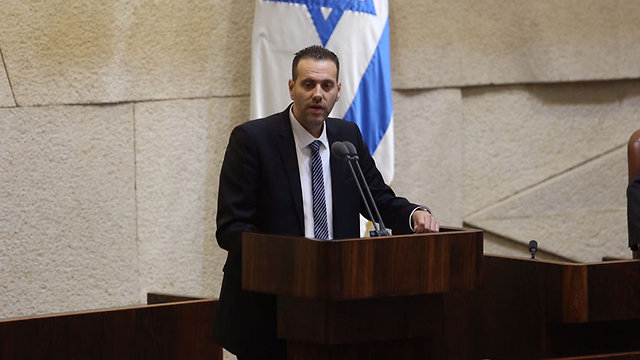
Gov't promoting legislation benefitting ultra-Orthodox
United Torah Judaism demands state to fund life insurance to yeshiva students, set to cost NIS 36 million, while Bayit Yehudi MK stonewalling reform in compulsory car insurance until discount is given to Shabbat observers.
The government is promoting legislation that would increase the benefits for Israel's ultra-Orthodox sector, including state-funded life insurance for yeshiva students and discounts on car insurance to those who don't drive their cars on Saturdays.
Meanwhile, Likud MK Miki Zohar's legislation aimed at closing all stores on Shabbat, and thus changing the status quo in favor of the ultra-Orthodox, has encountered a bump in the road.
State-funded life insurance
United Torah Judaism has demanded to increase the benefits given to 120,000 yeshiva students so they could buy life insurance.
Upon their return to the government after a term away from the coalition, the ultra-Orthodox parties pushed to double the benefits given to yeshiva students in order to bring them back to what they were before former finance minister Yair Lapid led the move to cut the benefits. Now, yeshiva students will receive an additional NIS 36 million a year to pay for life insurance.
Originally, Shas Deputy Minister Yitzhak Cohen proposed a plan to take the life insurance fee out of the existing benefits given to yeshiva students, thus reducing their salaries slightly.
But Health Minister Yaakov Litzman and Knesset Finance Committee chaiman Moshe Gafni, both of UTJ, opposed the idea and demanded Deputy Minister Cohen find additional funds to finance the plan.
According to the agreement eventually reached with UTJ, benefits given to yeshiva students will increase from about NIS 860 a month to about NIS 885 a month, with the additional NIS 25 used to cover insurance costs. If a yeshiva student were to pass away, his family would receive NIS 500,000 in death benefits, paid in monthly installments for 15 years.
Representatives of Shas, UTJ, and Bayit Yehudi have been holding discussions in order to decide from which of the ministries under their control the money would be taken.
As part of Cohen's maneuver, done in collaboration with Education Minister Naftali Bennett (Bayit Yehudi), the Finance Ministry is expected to issue a tender to determine the insurance provider. "The coverage will be bought in a competitive process, and its cost will be redacted from the budget given to yeshiva students," Cohen's office said.
Discounted car insurance
The Finance Ministry is promoting a reform intended to lower the price of compulsory car insurance significantly, but it will have to wait, as Bayit Yehudi MK Nissan Slomiansky is demanding that a further discount be given to those who do not drive their cars one day a week.
According to the reform led by the Finance Ministry's Capital Market, Insurance, and Savings Department, insurance companies will be able to offer a discount on compulsory car insurance rates based on three parameters: The existence of a Driver Monitoring System in the vehicle, the car owner attending a Driver Improvement Course, and the kilometers the driver is expected to put on the car during that year.
During a discussion at the Knesset's Constitution, Law, and Justice Committee, chaired by Slomiansky, about the reform on Monday, the Bayit Yehudi MK claimed that the car's inactivity for one day a week lowers the risk by one seventh.
Finance Ministry representative Asaf Michaeli quickly responded that "we don't know that the risk goes down, since drivers drive more on other days. I don't know any research that examined the effect (of the inactivity) for one day of the week on risk."
Slomiansky then decided to delay the committee's vote on the car insurance reform until such research is conducted.
Slomiansky's request was in fact intended to give a discount for those who observe Shabbat. MK Mickey Levy (Yesh Atid) slammed the suggestion, saying that "The one-day-a-week discount will screw over the secular people."
Members of the ultra-Orthodox sects quickly backed Slomiansky. "A one-day-a-week shutdown is accepted for comprehensive insurance premiums, there's no reason why it shouldn't be so with compulsory insurance," said MK Uri Maklev of UTJ. "Let's allow the companies to offer the discount if they want to."
His fellow UTJ MK Moshe Gafni added that, "a person who drives less, gets into fewer accidents. It can't be that a person who drives fewer days should pay the same as a person who drives for seven days."
According to insurance companies' estimates, about 20 percent of drivers are either Orthodox or ultra-Orthodox, and about 10 percent others are traditionalists who don't drive on Shabbat.
Some of the insurance companies already offer a symbolic discount to religious drivers in comprehensive insurance premiums. The Ayalon insurance company was the first to offer such a discount, which stood at 7.5 percent.
Ayalon's former CEO, Noga Rachmani, told Calcalist that initially the discount was given without any basis in research. "A few years ago, we decided to do a statistical analysis that showed there wasn't necessarily a justification for that assumption, since the religious public fills in the mileage after the Shabbat ends. We lowered the discount, which is more of a promotional tool these days and less a result of lowered risk."
The Harel Insurance company is also offering such a discount, at five percent. Smaller companies are offering discounts of ten to 15 percent.
The Shabbat law
A controversial proposal by Likud MK Miki Zohar seeks to bar businesses across the country from opening their doors on Saturdays, and sets fines of three days' worth of profits on those who do open on Shabbat.
The legislation, which was approved by the Ministerial Committee for Legislative Affairs three weeks ago, was supposed to be put to a preliminary vote at the Knesset earlier this week. But Zohar decided to pull the legislation the morning of the vote, citing a request by Prime Minister Benjamin Netanyahu.
"This is a complex law that includes wide-scale consequences and has a great Jewish and socialist value," Zohar explained, "and that's why I will work to reach agreements with my colleagues in the coalition and opposition."
The legislation currently does not have a majority within the coalition. Three MKs from Kulanu - Rachel Azaria, Roy Folkman and Eli Cohen - have all announced they would oppose the law, while party leader Moshe Kahlon expressed unease about it.
Likud MKs David Bitan and Amir Ohana also announced they would oppose the bill. "This is an anti-liberal law that deepens religious coercion," Ohana said.
In fact, the ministerial committee decided that the bill cannot move forward until a committee led by PMO Director-General Eli Groner, which is examining the issue of businesses opening on Shabbat, submits its conclusions.













